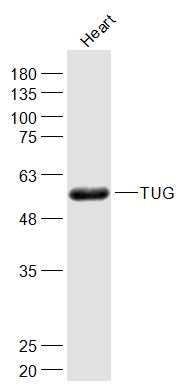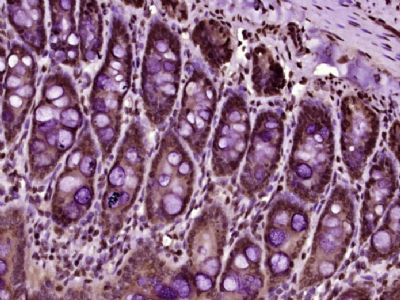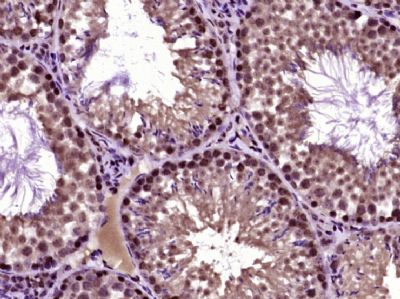TUG Polyclonal Antibody
Purified Rabbit Polyclonal Antibody (Pab)
- SPECIFICATION
- CITATIONS
- PROTOCOLS
- BACKGROUND

Application
| WB, IHC-P, IHC-F, IF, ICC, E |
|---|---|
| Primary Accession | Q9BZE9 |
| Reactivity | Rat |
| Host | Rabbit |
| Clonality | Polyclonal |
| Calculated MW | 60 KDa |
| Physical State | Liquid |
| Immunogen | KLH conjugated synthetic peptide derived from human TUG/ASPC |
| Epitope Specificity | 351-420/553 |
| Isotype | IgG |
| Purity | affinity purified by Protein A |
| Buffer | 0.01M TBS (pH7.4) with 1% BSA, 0.02% Proclin300 and 50% Glycerol. |
| SUBCELLULAR LOCATION | Endomembrane system; Peripheral membrane protein. |
| SIMILARITY | Contains 1 UBX domain. |
| SUBUNIT | Interacts with GLUT4. |
| DISEASE | Note=A chromosomal aberration involving ASPSCR1 is found in patients with alveolar soft part sarcoma. Translocation t(X;17)(p11;q25) with TFE3 forms a ASPSCR1-TFE3 fusion protein. Note=A chromosomal aberration involving ASPSCR1 has been found in two patients with of papillary renal cell carcinoma. Translocation t(X;17)(p11.2;q25). |
| Important Note | This product as supplied is intended for research use only, not for use in human, therapeutic or diagnostic applications. |
| Background Descriptions | Glut4 is a twelve pass transmembrane protein (12TM) whose carboxy-terminus may dictate its cellular localization. Aberrant Glut4 expression has been suggested to contribute to such maladies as obesity and diabetes. Glut4 null mice have shown that while functional Glut4 protein is not required for maintaining normal glucose levels, it is necessary for sustained growth, normal cellular glucose, fat metabolism and prolonged longevity. TUG (ASPL in humans) regulates the trafficking of glucose via Glut4. Full-length TUG forms a complex with Glut4 and in 3T3-L1 adipocytes and this complex is present in unstimulated cells and is disassembled by insulin. TUG acts by trapping endocytosed Glut4 and tethering it intracellularly. Insulin mobilizes this pool of retained Glut4 by releasing the tether. |
| Gene ID | 79058 |
|---|---|
| Other Names | Tether containing UBX domain for GLUT4, Alveolar soft part sarcoma chromosomal region candidate gene 1 protein, Alveolar soft part sarcoma locus, Renal papillary cell carcinoma protein 17, UBX domain-containing protein 9, ASPSCR1, ASPL, RCC17, TUG, UBXD9, UBXN9 |
| Target/Specificity | Ubiquitous. Highly expressed in testis, heart, skeletal muscle and pancreas. |
| Dilution | WB=1:500-2000,IHC-P=1:100-500,IHC-F=1:100-500,ICC=1:100-500,IF=1:100-500,ELISA=1:5000-10000 |
| Storage | Store at -20 ℃ for one year. Avoid repeated freeze/thaw cycles. When reconstituted in sterile pH 7.4 0.01M PBS or diluent of antibody the antibody is stable for at least two weeks at 2-4 ℃. |
| Name | ASPSCR1 |
|---|---|
| Synonyms | ASPL, RCC17, TUG, UBXD9, UBXN9 |
| Function | Tethering protein that sequesters GLUT4-containing vesicles in the cytoplasm in the absence of insulin. Modulates the amount of GLUT4 that is available at the cell surface (By similarity). Enhances VCP methylation catalyzed by VCPKMT. |
| Cellular Location | Endomembrane system; Peripheral membrane protein. Endoplasmic reticulum-Golgi intermediate compartment membrane; Peripheral membrane protein. Cytoplasm Nucleus |
| Tissue Location | Ubiquitous. Highly expressed in testis, heart, skeletal muscle and pancreas. |

Thousands of laboratories across the world have published research that depended on the performance of antibodies from Abcepta to advance their research. Check out links to articles that cite our products in major peer-reviewed journals, organized by research category.
info@abcepta.com, and receive a free "I Love Antibodies" mug.
Provided below are standard protocols that you may find useful for product applications.
If you have used an Abcepta product and would like to share how it has performed, please click on the "Submit Review" button and provide the requested information. Our staff will examine and post your review and contact you if needed.
If you have any additional inquiries please email technical services at tech@abcepta.com.













 Foundational characteristics of cancer include proliferation, angiogenesis, migration, evasion of apoptosis, and cellular immortality. Find key markers for these cellular processes and antibodies to detect them.
Foundational characteristics of cancer include proliferation, angiogenesis, migration, evasion of apoptosis, and cellular immortality. Find key markers for these cellular processes and antibodies to detect them. The SUMOplot™ Analysis Program predicts and scores sumoylation sites in your protein. SUMOylation is a post-translational modification involved in various cellular processes, such as nuclear-cytosolic transport, transcriptional regulation, apoptosis, protein stability, response to stress, and progression through the cell cycle.
The SUMOplot™ Analysis Program predicts and scores sumoylation sites in your protein. SUMOylation is a post-translational modification involved in various cellular processes, such as nuclear-cytosolic transport, transcriptional regulation, apoptosis, protein stability, response to stress, and progression through the cell cycle. The Autophagy Receptor Motif Plotter predicts and scores autophagy receptor binding sites in your protein. Identifying proteins connected to this pathway is critical to understanding the role of autophagy in physiological as well as pathological processes such as development, differentiation, neurodegenerative diseases, stress, infection, and cancer.
The Autophagy Receptor Motif Plotter predicts and scores autophagy receptor binding sites in your protein. Identifying proteins connected to this pathway is critical to understanding the role of autophagy in physiological as well as pathological processes such as development, differentiation, neurodegenerative diseases, stress, infection, and cancer.




